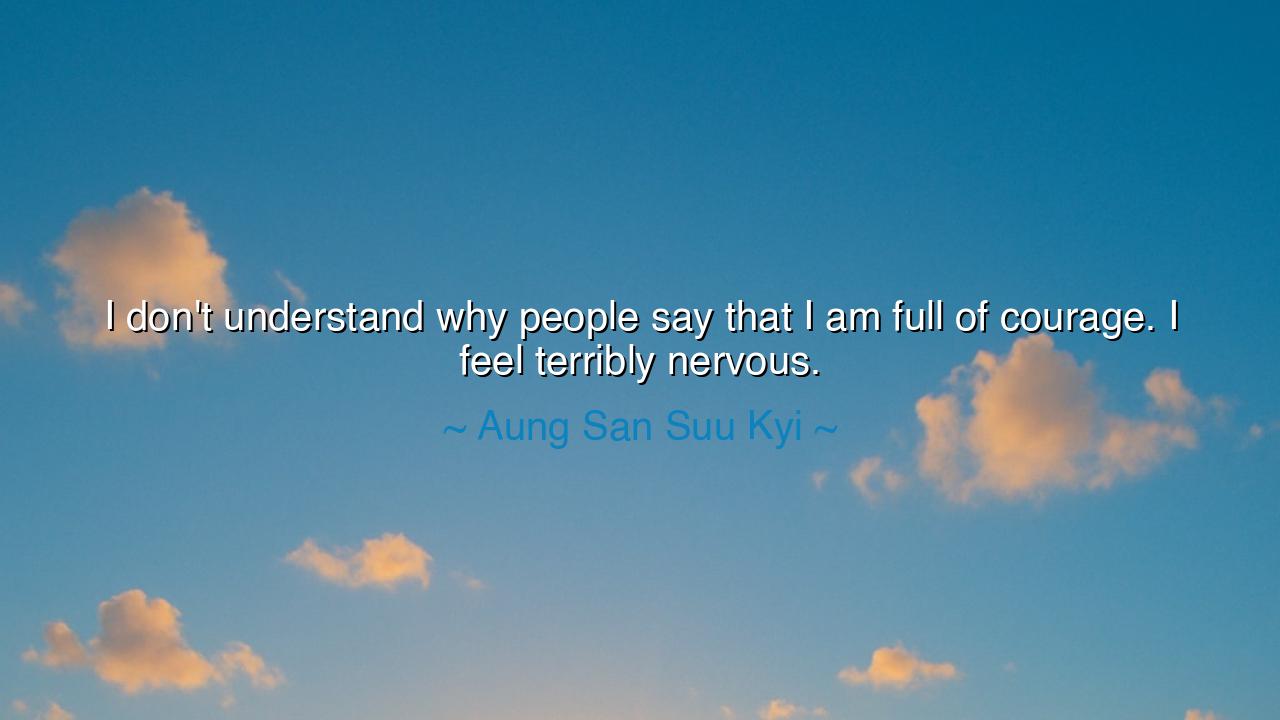
I don't understand why people say that I am full of courage. I






“I don’t understand why people say that I am full of courage. I feel terribly nervous.” — Thus spoke Aung San Suu Kyi, the woman who stood unarmed before the weight of tyranny, whose calm defiance inspired millions to believe in the quiet power of truth. These words, though simple, hold the depth of ancient wisdom: that courage is not the absence of fear, but the triumph over it. In her confession lies a truth that humbles the proud — that those who appear brave are often trembling within, yet they act nonetheless. For true bravery is not born from invincibility, but from resolve, the steadfast choice to move forward even when the heart quakes.
The origin of this quote lies in the long and painful struggle that defined Suu Kyi’s life. The daughter of Burma’s independence hero, she was called not by ambition but by duty — to guide her people through oppression toward freedom. When she stood against the military regime, she did so not as a soldier but as a woman armed with conscience. Years of house arrest, isolation, and uncertainty became her companions. In those years, the world saw in her a saintly courage, an unbreakable will. Yet she herself felt only the tremors of human weakness. Her words remind us that even the strongest hearts beat with fear — that the sacred fire of courage burns brightest in those who admit their trembling, yet do not let it rule them.
In saying “I feel terribly nervous,” Suu Kyi dismantles the illusion of the heroic ideal. She speaks not as a statue of marble, but as a living soul — fragile, uncertain, human. This is what makes her courage all the greater. For the hero who feels no fear knows nothing of bravery; only the one who walks through fear can truly be called brave. It is in the clash between terror and conviction that true moral strength is forged. Suu Kyi’s nervousness was not a weakness, but the proof of her humanity — and her triumph was not in silencing fear, but in refusing to obey it.
History has always crowned such trembling hearts with greatness. Consider Mahatma Gandhi, who confessed to being plagued by self-doubt before every march and protest. Or Nelson Mandela, who admitted that during his long imprisonment, he often felt despair. Yet each, like Suu Kyi, learned to master fear by serving something greater than themselves — the cause of justice, the call of freedom, the dignity of the human spirit. Their trembling did not undo them; it reminded them that they were still human, and that courage is not granted to the fearless, but to the faithful.
There is also a sacred humility in Suu Kyi’s words. She does not claim the mantle of heroism, for she knows that true courage is silent, not boastful. Those who act from ego seek the glory of being called brave; those who act from love do not notice their bravery at all. When the heart is devoted to something greater — to country, to truth, to compassion — courage becomes an afterthought, an inevitable expression of integrity. Suu Kyi’s “nervousness” was not cowardice but conscience — the weight of knowing that her choices might bring suffering, yet choosing rightly regardless.
Her words also speak to every soul who has ever felt small before the storms of life. The nervousness she describes is not unique to the battlefield or the prison cell; it lives in every act of faith. To speak truth when silence is safer. To love when love risks pain. To begin anew when failure whispers of defeat. Each of these is a form of courage, quiet and unseen, born from the same fire that burned within Suu Kyi. Her teaching, then, is that courage is not a gift of the gods, but a practice of the heart — a daily decision to face what must be faced, even with trembling hands.
So, my listener of the ages, take this wisdom into your life: do not wait for fear to vanish before you act. Let your nervousness remind you that you are alive, that something precious is at stake. When your heart beats fast and your voice shakes, step forward anyway — for that is the moment when courage is born. You need not feel brave to live bravely; you need only to act from truth, even when afraid.
For in the end, Aung San Suu Kyi’s quiet confession reveals the deepest secret of strength: that fear and courage walk hand in hand. The one gives meaning to the other, as shadow gives shape to light. So when you feel terribly nervous, remember her words — and remember that even the heroes of history trembled before their greatest deeds. Yet they acted. And so may you.






AAdministratorAdministrator
Welcome, honored guests. Please leave a comment, we will respond soon